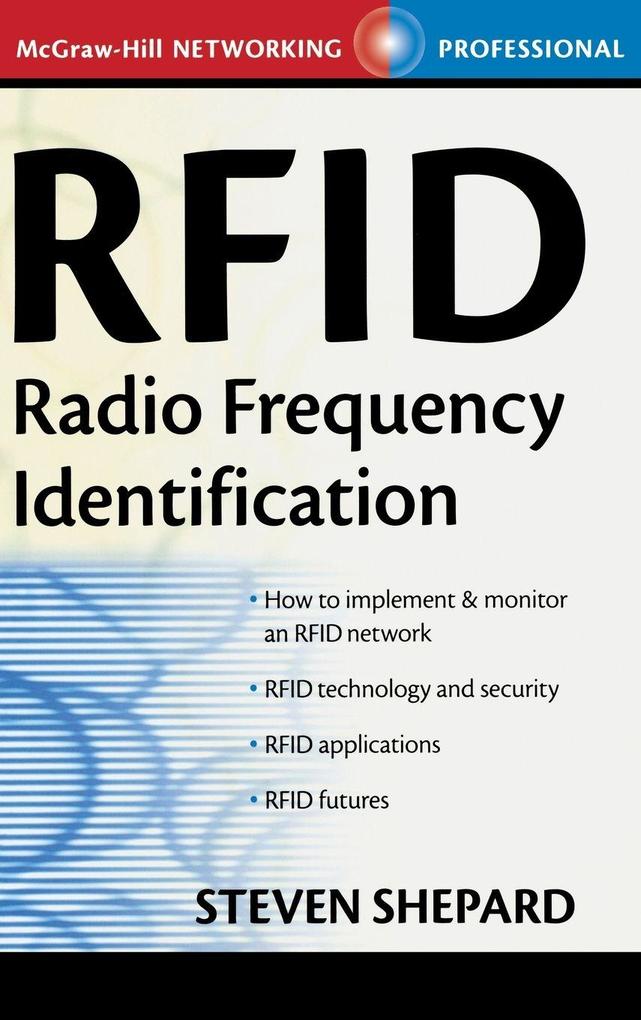Publisher's Note: Products purchased from Third Party sellers are not guaranteed by the publisher for quality, authenticity, or access to any online entitlements included with the product.
TAG THE HOTTEST GROWTH IN WIRELESS
With a predicted $10-billion market over the next decade, RFID (Radio Frequency Identification) is a booming new wireless technology with an eager new audience-retailers. From global giant Wal-Mart down, RFID is being adapted to track inventories via microchip-tagged products. Popular technology writer Steven Shepard's RFID gives you an inside look at the entire arena, from the technology's staggering capabilities and potential, through insightful coverage of issues from vendors, implementation, and monitoring, to possible technical conflicts, market forecasts, and security.
A must-read for both technical types and retailers, this book's need-to-know contents include:
Defining RFID ¿ Underlying Technologies ¿ Technological Competitors ¿ Future RFID Applications ¿ RFID/3G/Bluetooth Coexistence ¿ Implementation ¿ Potential Roadblocks ¿ RFID Security ¿ RFID Chips, Readers, and Applications Sets ¿ Short- and Long-Term Forecasts
Inhaltsverzeichnis
<h2>PART ONE. BUSINESS ENABLERS <H3>Supply Chains: A Brief Overview <H3>The ServicePlus Story <H3>The History of Barcodes <H4>The 1790 Census <H4>From Census . . . to Groceries <H4>Tracking the Railroads <H4>Back to Groceries <H3>Barcodes . . . Up Close and Personal <H4>Encoding Details <H4>Digit Encoding in UPC A <H4>UPC Version E <H4>The Application Identifier <H4>Beyond Groceries <H3>Conclusion <H4>RFID History <H4>Pre-RFID: The Arrival of Radar <H4>First Deployments: Chain Home Radar <H4>Post-Radar Development Efforts <H4>The First RFID Tag: Mario Cardullo <H4>Later Developments <H3>In Summary <h2>PART TWO. RFID IN DETAIL <H3>Typical RFID System Components <H3>Transponders <H4>Passive vs. Active Transponders <H3>Operating Frequencies <H4>Frequency Attributes <H3>Form Factors <H3>Smart Cards <H3>Close-Coupling Smart Cards <H3>A Brief Aside: Inductive vs. Capacitive Coupling <H3>Proximity-Coupling Smart Cards <H4>Part 1: Physical Device Parameters <H4>Part 2: RF Characteristics <H4>Part 3: Initialization and Collision Control <H4>Manchester Encoding <H4>Transponder Selection <H4>Collision Management in Action <H4>The REQB Frame <H4>The ATQB Frame <H3>Slotted Aloha: How It Works <H4>The Air Interface: Data Communications Protocols <H4>Initiating Data Transmission <H4>Application Protocol Support <H3>Layer by Layer <H4>Layer Seven: The Application Layer <H4>Layer Six: The Presentation Layer <H4>Layer Five: The Session Layer <H4>Layer Four: The Transport Layer <H4>Layer Three: The Network Layer <H4>Layer Two: The Data Link Layer <H4>Layer One: The Physical Layer <H4>OSI Summary 107<H3>The OSI Model and the RFID Interface <H3>Vicinity-Coupling Smart Cards <H4>ISO 15693 Part One: Physical Device Characteristics <H4>ISO 15693 Part Two: RF Power, Data Transfer, and FrameStructures <H4>Data Transfer: Downstream, Reader to Card <H4>Data Transfer: Upstream, Card to Reader <H4>A Brief Aside: RFID Readers <H4>Enterprise Resource Planning (ERP) <H4>The ERP Process <H3>Summary <H3>RFID Security Considerations <H4>Key Security Considerations <H4>Privacy Concerns












